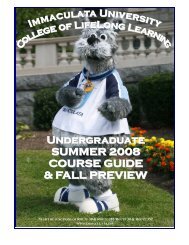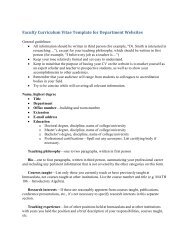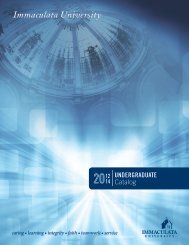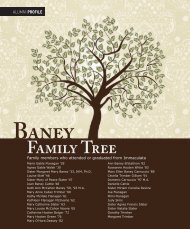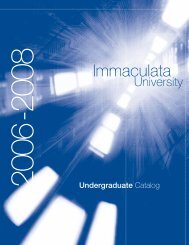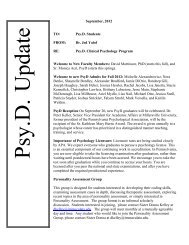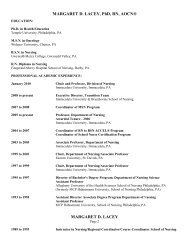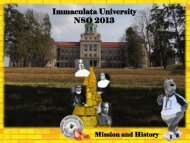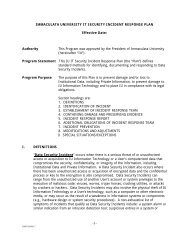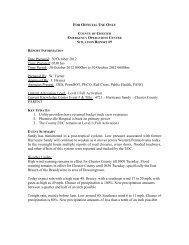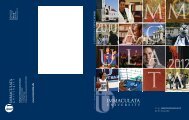Undergraduate Catalog 2008-2010 - Immaculata University
Undergraduate Catalog 2008-2010 - Immaculata University
Undergraduate Catalog 2008-2010 - Immaculata University
You also want an ePaper? Increase the reach of your titles
YUMPU automatically turns print PDFs into web optimized ePapers that Google loves.
ORG 304 Organizational Communications (3)<br />
Investigates the role of communication in creating a productive<br />
organizational environment. Aids students in developing and<br />
strengthening their communication skills by focusing on<br />
interpersonal, group, and presentation skills.<br />
ORG 307 Adult Development and Life Assessment (3)<br />
Introduction to adult development theory, linking concepts to life<br />
experiences through a process of individual reflection. Classical and<br />
contemporary adult development theories are examined to provide<br />
paradigms for self-analysis and life assessment.<br />
ORG 312 Introduction to Applied Research (3)<br />
This course introduces students to the research design process<br />
and hones analytical thinking skills. It includes one on-campus<br />
meeting devoted to library orientation, investigation of campus<br />
resources, and an introduction to the writing center. Students begin<br />
their research project with a literature review and receive assistance<br />
in establishing topics for their research proposal. Students create a<br />
research problem statement and consider basic research design<br />
elements.<br />
ORG 320 Research and Analysis Using Statistics (3)<br />
An introduction to research and its tools with specific emphasis<br />
upon helping students with the requirements of their research<br />
proposal. Content includes research design, descriptive and<br />
inferential statistics using Microsoft Excel. Students are given the<br />
opportunity to critique business research studies and discuss<br />
managerial decision-making.<br />
ORG 390 Research Methodology (3)<br />
In this course, students formulate a research problem statement,<br />
identify a hypothesis, possible interventions and analyses. Students<br />
make a professional presentation of their own research topics.<br />
CCS 341 Cultural Modes of Expression in the Global<br />
Community (3)<br />
An exploration of the nuances of intercultural expression for an<br />
awareness and sensitivity needed for mutual understanding in<br />
international affairs.<br />
ENG 242 Writing for Applied Research (3)<br />
This course introduces students to the theoretical principles and<br />
practical applications of academic research with a focus on<br />
business. Students learn to form initial inquiry questions, locate and<br />
evaluate print and electronic sources, and summarize, paraphrase,<br />
and incorporate source material in written presentations using the<br />
APA citation format.<br />
PHI 384 Organizational Ethics (3)<br />
A study of ethical situations in organizations, accountability in<br />
government, respect for human rights, and responsibility for<br />
contemporary life choices. Ethical theories and personal values are<br />
examined through readings and analysis of situations in<br />
organizations.<br />
THE 381 Foundations of Spiritual Freedom (3)<br />
This course explores the foundations of morality and adult<br />
spiritual formation. Through study of the Biblical roots of holiness,<br />
a focus on Christ as model, and an analysis of virtue, the student<br />
will come to know the path to authentic freedom.<br />
ORGANIZATION DYNAMICS (BA) (OFFERED<br />
ONLY THROUGH ACCEL ® PROGRAMS)<br />
REQUIREMENTS FOR DEGREE COMPLETION<br />
• Liberal Arts: English (9); world civilization (3); foreign<br />
language (3)*; philosophy (6)*; theology (6)*; designated<br />
humanities (6)*; social science (9)*; laboratory science (3);<br />
mathematics (3).<br />
*Three credits each of foreign language, philosophy, humanities,<br />
and social science may be met through successful completion of<br />
modules within ACCEL ® .<br />
• Major: ORG 301, 303, 304, 307, 312, 320, 342, 343, 344, 345,<br />
382, 383, 390; CCS 341; ENG 242; PHI 384; THE 381.<br />
• Electives as needed to complete a total of 126 credits.<br />
ORG 301 Group and Organizational Behavior (3)<br />
The study of group behavior and how group functioning affects<br />
organizational effectiveness. Emphasis is placed upon decisionmaking<br />
and conflict resolution. Students develop strategies for<br />
efficient and productive group management and determine which<br />
tasks are handled by groups or by individuals.<br />
ORG 303 Organizational Concepts (3)<br />
Students examine the formal and informal functions of<br />
organizations and analyze an agency or organization based upon a<br />
systems model. Students also explore and solve organizational<br />
problems using a step-by-step method. This analysis will be applied<br />
to students’ research proposal which typically is work-related.<br />
ORG 304 Organizational Communications (3)<br />
Investigates the role of communication in creating a productive<br />
organizational environment. Aids students in developing and<br />
strengthening their communication skills by focusing on<br />
interpersonal, group, and presentation skills.<br />
ORG 307 Adult Development and Life Assessment (3)<br />
Introduction to adult development theory, linking concepts to life<br />
experiences through a process of individual reflection. Classical and<br />
contemporary adult development theories are examined to provide<br />
paradigms for self-analysis and life assessment.<br />
ORG 312 Introduction to Applied Research (3)<br />
This course introduces students to the research design process and<br />
hones analytical thinking skills. It includes one on-campus meeting<br />
devoted to library orientation, investigation of campus resources,<br />
and an introduction to the writing center. Students begin their research<br />
project with a literature review and receive assistance in establishing<br />
topics for their research proposal. Students create a research problem<br />
statement and consider basic research design elements.<br />
ORG 320 Research and Analysis Using Statistics (3)<br />
An introduction to research and its tools with specific emphasis<br />
upon helping students with the requirements of their research<br />
proposal. Content includes research design, descriptive and<br />
inferential statistics using Microsoft Excel. Students are given the<br />
opportunity to critique business research studies and discuss<br />
managerial decision-making.<br />
ORG 342 Managerial Economics (3)<br />
A focus on the principles of economics as needed to be<br />
understood and utilized by managers and supervisors in all fields.<br />
In an era of “downsizing” or “rightsizing” resulting from<br />
international competition and globalization in our American way of<br />
life, managers at every level must understand and be able to use the<br />
principles of economics in making sound decisions.<br />
50



